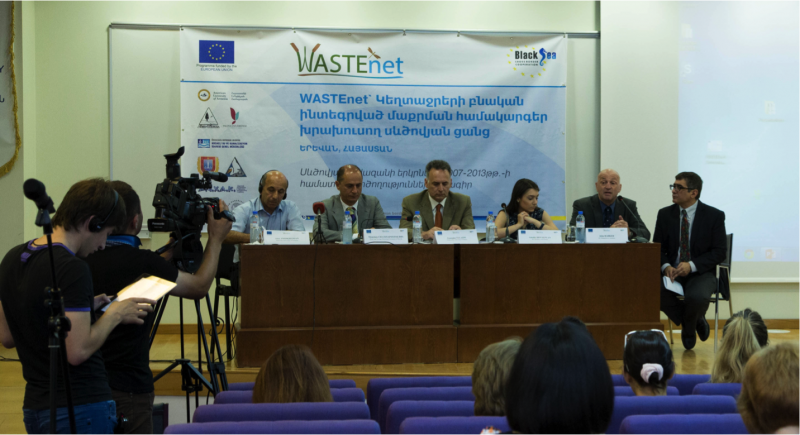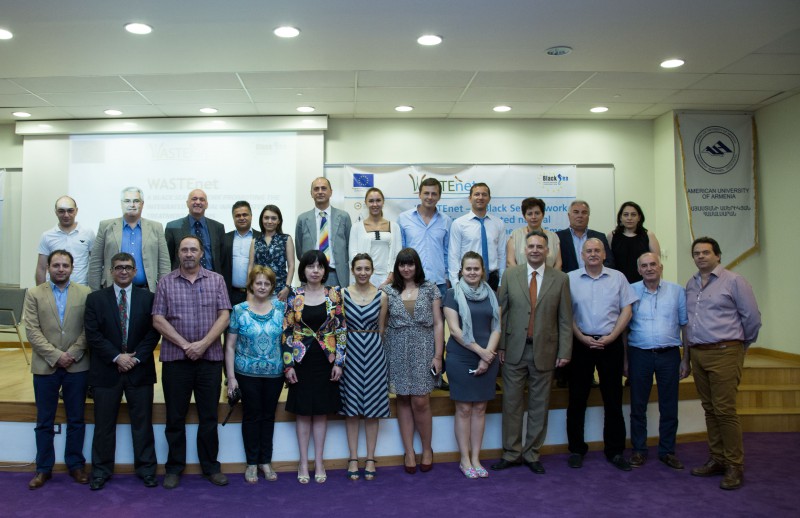
EU-funded Black Sea Regional Workshop in Armenia on Natural Treatment Systems for Wastewater
2 min readYEREVAN, Armenia – On July 2, 2014, the American University of Armenia (AUA)’s Acopian Center for the Environment (AUA ACE) hosted a Black Sea Regional workshop on alternative solutions to wastewater treatment, especially by use of natural treatment systems.
The workshop was part of the EU funded Black Sea Cross Border Cooperation program’s WASTEnet project. AUA’s Acopian Center for the Environment is the Armenian partner on this project, which includes partners from seven Black Sea countries—Armenia, Georgia, Greece, Moldova, Romania, Turkey, and Ukraine.
Natural treatment systems, such as constructed wetlands or artificial lagoons, are engineered systems that replicate the way nature cleanses water. They are lower cost both in construction and maintenance when compared with conventional wastewater treatment systems.
The attendees discussed the current status of wastewater treatment in the region, legislation and regulation of the sector in different countries, technical aspects of natural treatment systems, as well as the role of civil society in promoting natural treatment systems.
Armenia and many Black Sea basin countries need to improve their wastewater treatment capabilities. This is particularly true in rural areas where conventional treatment systems are not feasible, says Alen Amirkhanian, director of the AUA Acopian Center for the Environment. “We hope this workshop will help Armenia and its regional neighbors to learn from international experience as well as efforts within their own countries on the use of natural treatment systems.”
The speakers at the workshop included experts from all partner countries, with a larger presence from Greece, the lead partner on the project. “Globally there is more than four decades of experience building and operating natural systems for wastewater treatment,” says Dr. Georgios Sylaios, associate professor of environmental engineering at the Democritus University of Thrace in Greece. He adds that these systems “have proven to be effective and highly cost competitive when compared to conventional treatment systems. Building and operating them can cost a tenth of the conventional systems.”
Another key objective of the EU-funded WASTEnet project is to promote regional cooperation. “This and all of EU’s Black Sea Cross Border Cooperation projects are intended to connect local and regional governments, civil society groups, as well as centers of knowledge like universities into learning hubs,” says John Barker, the international cooperation officer at the EU Delegation in Armenia.
Amirkhanian, director of the AUA Acopian Center, adds, “The value of such a network is beginning to show itself. The Greek expertise, added to the Turkish experience in building more than 85 such decentralized systems, and Armenia’s grassroots effort to build a natural treatment system in Parakyar are all pieces of the puzzle that we are putting together to develop and enhance capacity in each of our own countries.” Amirkhanian adds that such projects provide us with the opportunity to build capacity but actually using the resources offered to build capacity is up to each partner involved.
The agenda from the July 2 workshop may be viewed here. Media coverage of the event may be viewed here.
The AUA Acopian Center for the Environment (AUA ACE) is a research center of the American University of Armenia. AUA ACE promotes the protection and restoration of the natural environment through research, education, and community outreach. AUA ACE’s focus areas include sustainable natural resource management, biodiversity and conservation, greening the built environment, clean energy and energy efficiency, as well as information technology and the environment.
A press conference took place in conjunction with the workshop.
Participants in the Black Sea Regional Workshop in AUA’s Alex & Marie Manoogian Hall.



Comments are closed, but trackbacks and pingbacks are open.